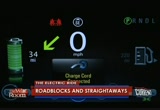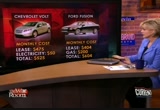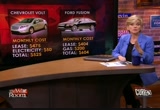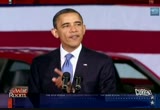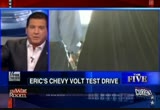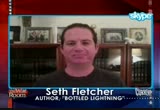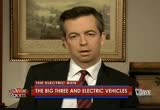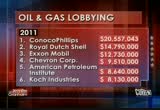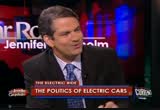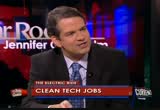tv The War Room With Jennifer Granholm Current November 27, 2012 9:00pm-10:00pm PST
9:00 pm
level, it is something you did with great hesitancy because your could be job is to defend laws even if you don't like them. thank you richard tonight. i'll see you here >> jennifer: i'm jennifer granholm. and i'm in love with a car. an electric car. with slick lines and hip style it's the strong, silent type that knows how to hug the curves in just the right way. i guess virginia slims did have it right. we've come a long way baby. >> release the gas. step on the clutch. shift into high. release the clutch. step on the gas. but in a smart new oldsmobile,
9:01 pm
just step on the gas and go! >> jennifer: this week and tonight, we're going to peer into the future and look at the latest marvels of modern engineering at the annual los angeles auto show. and the future is a deep shade of green with electric cars galore. be still my beating heart. g.m. alone is unveiling two new electric models and predicts it is going to sell 500,000 electric cars in the next five years. and one of them that's getting a lot of the buzz is this cute little guy the chevy spark. it's entirely electric. it goes 0 to 60 in 8 seconds and it charges in just 20 minutes. plus, it's cheaper than many
9:02 pm
rivals. it costs about $25,000 after a federal tax credit. but, of course, i'm partial to the spark's big brother the incredible amazing chevy volt. okay, i'm a little obsessed but i'm going to show you why. let's go for a ride. okay so here we are in this fabulous volt. it is the best car i have ever owned. my big question is why doesn't everybody else own one? you have to put your seat belt on. we're in the middle of a city and if you were in a regular car, you would be hearing the engine hum. in this car you don't hear anything. it sounds like the car is off. it's so quiet! and luxurious. now some people find that disturbing. so the auto companies have now taken to offering you the option -- they're exploring putting this on a number of different electric vehicles where you can pick your sound.
9:03 pm
so if you wanted to have a sound of a revving engine with real torque, you could opt to put that on your very quiet car. why you would, i don't know. but some people like the sound of power. this car goes about 36, 37 sometimes 40 miles on a charge. it is a battery picture that says i have 35 miles -- 34 miles to go before i'm out. so once i'm done with using all of the electric charge, it then flips over to be a regular gasoline engine. i don't have to worry about what is known as range anxiety, being afraid i'm going to run out of electricity and not be able to go because i always have gas in the tank. so quiet. the great thing is, got a
9:04 pm
three-prong plug, right. i have my extension cord that comes with the car. it's got a unique kind of plug. put it in. and you know that it's charging because in just a second, this light turns to green and it goes -- it is so easy. and fantastic! okay. so you might be asking how much does one of these fantastic planet-saving cars cost? well so i lease my chevy volt at $475 a month. you see over there. plus i spend about $50 for the electricity extra. that's charging it at home. now we used to live in a house with solar panels. talk about cheap clean -- i'm trying to get inexpensive american made solar panels at our newhouse. when i figure that out i'll let you know. the overall cost of owning and driving the volt is about $525 a
9:05 pm
month. so compare that to what we pay for our other car. it is a gas-powered ford fusion which we also love. it has an internal combustion engine. it uses gasoline. the monthly payment for that lease is $404 and the monthly gas bill for that car is $200 so the total for that is $604. the difference between the two cars including fuel is about $80 a month and that's automatic $1,000 a year. and over ten years the overall difference in fuel cost between them is about $13,564. that's what we would not pay in driving the volt. now, the problem for many consumers is that initial cost is so high because a volt does cost -- if you buy it, $32,000. a new study by the j.d. power
9:06 pm
and associates predicts that "electric vehicles will remain a very small part of the u.s. market unless automakers can lower prices and demonstrate the economic benefits to consumers." of course, the most expensive part of the electric vehicle is the battery. and that battery costs between $12,000 and $15,000 today. but it is always this way with new technologies. they start out, as you know, really pricy and they come down over time. for example the cost of a cell phone in 1982 was almost $4,000. and it weighed in at over two pounds. but by 1996, the cost was down to just $1,000. what a bargain. fast forward to today and the average phone costs about $200 and if you're a bagg ain shopper, it cab less than that. so similarly, the price of electric cars and that battery is coming down. demand is going up. sales of electric cars have
9:07 pm
increased by about 180% over last year and smart policies are helping to push even more production. for example, the obama administration implemented a federal program this year to lower emissions required emissions over the next two decades. here's the president describing what that policy will do. >> obama: by 2025, the average fuel economy of their vehicles will nearly double to almost 55 miles per gallon. it will save a typical family more than $8,000 in fuel costs over time. >> jennifer: now of course, if you get an electric vehicle like i have, it is over 250 miles per gallon if you go to the gas at all. anyway, if president obama likes it, then the right wing, of course, must hate it! and they do. with a passion and vitriol that is usually reserved for the war
9:08 pm
on christmas and misplaced birth certificates. >> even with the $7500 federal rebate or whatever you get for it, it is still beyond pricy for a fred flintstone car. >> trying to push this crazy green agenda. we're twice the size. >> i can't tell you how annoying. get out of car. go in the trunk. get this long cord. hook it into the side. plug it into the wall. >> first world problem. >> it was raining. i'm worried i'm going to get electrocuted. >> the electric car is about taking away choices from the american people about -- the electric car is about bigger government. >> stephanie: ahhh! that's just what the conservatives think that cars ought to be the gas guzzling monstrosities and the government should be small enough to drown in a bathtub. i don't remember the last time i went to the gas station to fill up! the reason the volt gets so much
9:09 pm
flak from the right is that it's made by g.m. which, of course, is the auto company that the president bailed out and it uses batteries that are made by companies that benefitted from the president's stimulus package. so if the product is a success then the obama administration's policies are a success and oh, that cannot happen! and here's the most delicious irony of all. guess who set the stage for the fuel standards that are driving the success? why, the very object of republican hero worship ronald reagan. in 1967, then california governor ronald reagan created california's clean air agency which is the agency that created the zero emissions standard and is spurring electric car development. ronald reagan, godfather of modern conservatism and the electric car? somebody get rush limbaugh
9:10 pm
another tranquilizer. coming up, one of the reasons we wanted to focus on electric cars tonight is that it is such an america in the 21st century story. it's politics and it is personalities. it is old technology versus new. it is about adapting our culture and our lives and our work force and our economy to a world that changes so fast that if you blink, you're already two steps behind the other guy. and we're going to explore all of that tonight. i can't wait! so if you own a car if you've ever ridden in a car, you should definitely stick around and proudly call up any of your friends who have done the same and tell them to watch as well. it is "the war room" on a tuesday night. we're just getting revved up for a big hour on the future of our country.
9:13 pm
>> jennifer: of course all of the domestic auto industry are spending money investing in electric vehicles, ford is, chrysler is. of course, general motors is as well. spending big bucks actually to promote the chevy volt. maybe you've seen the commercials. >> over the course of the year the average driver goes around 15,000 miles. the average new car has a fuel economy of about 23 miles per gallon and if gas costs $3.56
9:14 pm
per gallon, you would spend $2,320 every year on fuel. now, let's say your new car is a volt. in addition to gas you're also running on electricity which costs about 12 cents per kilowatt hour. over the course of a year, the combined fuel cost for a volt is just $950. so in five years, you can save up to $6,850. >> jennifer: i love all of that. despite though the savings, many of the potential buyers are understandably scared off by the sticker price of electric vehicles. electric vehicles are also known as evs. so a new volt, even with a $7500 tax break which is still in effect that will still cost you nearly $32,000. and a comparable chevy cruze which runs on gas costs about $17,000. the difference of course being
9:15 pm
the battery. the initial cost though isn't the only reason that evs the sales haven't been as strong as many would have hoped. here to discuss barriers to the success of electric vehicles is seth fletcher, an editor with popular science magazine, the author of bottled lightning superbatteries, electric cars and the new lithium economy. he's joining us via skype from brooklyn new york. thanks for joining us in "the war room." >> thanks for having me. >> jennifer: you bet. can you just in very basic terms explain why electric cars are so expensive? >> as you've said, the main reason is because of the cost of the battery. these are huge, incredibly complicated versions of the lithium ion batteries we have in our cell phones and laptops. but the real problem is there's no fundamental reason the batteries can't get a lot cheaper. the very first battery was hand built. now they're built in small
9:16 pm
batches. here, you arrive at this dilemma, the more people buy electric cars, the cheaper they'll get. the cheaper they get the more people will buy them but how do you get started? so you know, as you noted in the first segment the obama administration has put a lot of resources into getting getting this ball rolling but you know, it's not going to happen immediately. it is going to take some sustained incubation to really get this to take off and so the cars can compete on their own merits. >> jennifer: let's talk about that. that's what everybody wants to know is how long until the price of an electric car is comparable to that of one with a regular internal combustion engine. a gas-powered engine. >> you see all kinds of forecasts and they're really forecasting is a dangerous practice. but what i will say is i think it will probably happen sooner than a lot of people would have expected. five years ago when g.m. first
9:17 pm
started talking about building the volt. the critics said the lithium ion bat i i -- batteries were going to cost $1500 per kilowatt hour. now we're sure we're down to about $600 per kilowatt hour. people estimate that will drop by half in the next few years and then by the next decade, it is going to be down really low. under $200 per kilowatt hour. those are numbers -- what that means is much cheaper. the other thing to consider here is you can pick how much battery you want for the application. you drive a volt. what are the advantages to the volt in addition to having that back-up gas engine is the fact by using a smaller battery, you don't have to put tens of thousands of dollars of additional batteries in there to make it -- 200 300 mile range. >> jennifer: seth, let me stop you for a second because the real key question that i want to hear from you is when is the
9:18 pm
tipping point arrived at? where the battery does not inflate the cost of a car so that it is on par with a regular car? because once that happens woo i think the lid comes off. when? >> the number is -- specific numbers are really hard. it is all about the price of batteries. if we get batteries down to $200 per kilowatt hour which is about 2/3 from what they are now that's really -- that's a big deal. particularly if they're looking at $5 a gallon gas. you start looking at something that's attractive. it depends on the way the world economy goes. it depends on the price. >>. >> jennifer: all right. i see you're not going to be committing. i'm -- i think that ten years is too long. the auto industry is more bullish than that but who knows. if you look at more is -- moore's law which talks about how quickly technology advances,
9:19 pm
it doubles essentially in its space and density every maybe two years every 18 months, that would suggest that if you've got the scale and you're producing a lot of them, that it could come down much more quickly than ten years. that's what i would say. do you agree? >> the catch is that batteries don't -- they do increase every year by about 7% capacity. the price is going down quickly. substantially. it's not exactly like computer chips. that's why batteries are such a difficult problem. for more than a century. and it's taken this long for technology to get to the place where electric cars could be as good as they are now. i think they're finally -- cars that you know, will meet american needs. they will love them if they can get in them and drive them. >> jennifer: seth, i agree with you. i think that they will totally love them if they get in them and try them.
9:20 pm
i have never had a better car. seth fletcher, editor with popular science magazine thank you for coming on even though you couldn't give me a specific prediction. you came close. up next, it is more than money. dark forces are at work here, my friends. they are speaking to keep the electric car locked in america's garage and we're going to name names after the break.
9:22 pm
9:23 pm
u.s. this year. that's about 0.3% of total u.s. vehicles sales. we've talked about economic barriers preventing electric cars from becoming more popular but there is more to it than just money. joining me with that side of the story is amy harder who is the energy and environmental reporter for the "national journal." she's coming to us from washington. and also in washington, david sheppardson, the d.c. bureau chief of the detroit news. welcome to you both inside "the war room." >> thanks, governor. >> thanks for having me. >> jennifer: amy let me start with you. the actual number of electric plug-in cars sold here as a percentage of the overall sales is very small. but talk about whether it is considered at least rapidly growing. >> i think it is all relative and it is growing. and it is growing substantially from where it was in say 2011 to where it is poised to be in 2012 after the next month when we see the final sales in december.
9:24 pm
it went from 2.23% in 2011, total car sales to right now it is at 3.3%. so it is going up. still a very small piece of the pie. i think that's what you need to remember that you need to keep this in perspective. one interesting dynamic is that a lot of the competition among the electric cars and the hybrids are actually each other. as opposed to traditional gasoline cars. >> jennifer: that's an important fact. and i think that a lot of that has to do with the number of factors. david, you cover the auto industry. i'm curious which members of congress have been the most vocal against electric vehicles. >> well, i think you have to look -- it is a lot of the tea party caucus and the house. all of the republican candidates opposed green energy loans for electric vehicles, mitt romney was very outspoken. he wanted to do away with the
9:25 pm
green energy loan programs that funded things like the nissan leaf. in fact, in 2011, the house republicans almost brought the government to a halt because they wanted to cut about 20% of the programs that allows auto companies to retool plants. so you know, there is a lot of members and as you pointed out earlier in the show, this did become, in part, you know, an anti-obama -- because the president has called for a million evs on the road and republicans, you know, opposed it for a lot of different reasons but one was certainly political. >> jennifer: for example the president and ceo of general motors dan ackerson is a known republican is the auto industry working republicans to get support for electric vehicles and if they are how come they're not more successful? is there an oil lobby on the other side of this? >> certainly the oil industry is very powerful. they are out lobbying but
9:26 pm
remember 2011, president obama during the state of the union called for increasing that ev tax credit to $10,000 not just making a tax credit but a point of sale refund. so you can get the $10,000 off a volt or a leaf or a tesla at the dealership as opposed to waiting to get it on your tax return but there really hasn't been a big push by auto companies in part for anything because the climate has shifted so much. it is very anti-government spending in general. they're talking about what programs to cut not what programs to add. and the auto companies have not made a real concerted effort to get more funding for evs since the stimulus deal about $2.4 billion for battery plants and electric vehicles. >> jennifer: that, to me, is something that is going to have to change. amy, we talked earlier about the economic factors that are hindering the growth of electric car sales. what else is preventing them from being taken up and being more popular?
9:27 pm
>> i think one dynamic that has actually changed in the last two to three years is the competition from other alternative fuels such as natural gas and hydrogen fuel cells. i think with the boom in natural gas production we're seeing in this country there is a big push on behalf of the big oil and natural gas companies that you talk about to really try to get to have a bigger market there for natural gas cars and not just trucks which is where they're usually talked about but also passenger vehicles. i think that's the new dynamic. >> jennifer: go ahead. what's another one? >> another one is one that is often talked about. the classic chicken and the egg syndrome. i know you talked about that early on in the show about making sure that customers have a fueling station for their car. and even though it is often very easy in practice, i think the thought of it scares people. and change is hard. when somebody drives a car every day, it is a hard barrier to
9:28 pm
overcome. >> jennifer: if they don't have a charge in their garage they have to figure out how to charge it up. david, talk about how important electric cars are for the big three automakers. >> the main driver as you pointed out earlier is california and they're mandating zero emission vehicles by 2025. they want to have half a million zero emission vehicles on the road. california's initial mandate in 1990 is what led to the ev1 g.m.'s first electric vehicle. and you know, it is not just about the incremental sales. ford, for example has only sold a little less than 400 ford focus evs in a year where it sold about 2,000 regular evs. the detroit 3 really struggled when they seeded that ground to the toyota prius not because the toyota prius has been highly profitable. it labeled toyota as the green
9:29 pm
company. as a result, they got a lot of customers to buy the corolla or the camry. so evs are in part halo vehicles to hepburnish the company's reputations. the detroit three are not building the gas guzzlers, the hummers. that brand doesn't exist. it is about reaching new customers even those who aren't going to buy a volt. maybe they'll buy a cruze or another efficient car. >> jennifer: quickly amy look in your crystal ball, you see electric car sales rising over the next 5 10 years? >> yeah, i definitely see them rising. not withstanding other outside factors such as another economic downturn. you saw that there -- their sales went down along with everybody else and economic crisis. so i think if the economy needs to improve they'll continue to go up. very slowly and gradually. with any new technology, there is the initial start-up phase
9:30 pm
where you can get into a niche market then you have to go from niche to math market. that's a challenging thing to overcome. two other things i would watch would be the cafe standards. president obama has been ambitious on that front and also gasoline prices. the auto industry won't say this but gasoline prices are the biggest drivers in whether or not people will go out and buy an electric car. >> jennifer: for sure. it is about personal economies. amy harder and david sheppardson, thank you for coming inside "the war room." i appreciate it. most republican lawmakers have never driven an electric car. so naturally they hate them. and if they don't like them, of course nobody can like them. and they're going to take their ball and go home. sad but true story is one that you're going to find hereeeeeeeeeeeeeeeeeeeeeeeeeeeee
9:34 pm
>> jennifer: as america drives toward the future, some politicians are trying to put on the brakes and "the war room" never will forget mitt romney and republicans knocking government support for clean energy investment and electric car production. >> romney: you know he put $90 billion, $90 billion in the stimulus, went into businesses he thinks have the greatest prospects like solyndra and fisker and tesla. he likes to pick winners and losers or as a friend said to me, no he picks losers.
9:35 pm
>> jennifer: thankfully romney's pandering didn't work and the only lose they're voters picked was him. here to break down why the right is so against clean energy and fuel efficient cars is donnie fowler. we know him as a savvy democratic strategist. you know his main job is fighting for clean tech. as ceo of dog patch strategies. welcome back inside "the war room" with that other hat on. maybe wearing both at the same time. let's talk about some of the positive signs. you recently did a presentation in silicon valley. you describe the difference between the clean energy folks and the anti-s as hippies versus cowboys or at least that's the way they're perceived. >> there is a cultural idea about green energy, electric vehicles solar power, that sort of continues to last especially for conservatives in the u.s. it is a bunch of hippy liberal tree huggers from san francisco
9:36 pm
who want us to throw away our light bulb. it is fiction. >> jennifer: what's the message tune-up? >> the message is that clean energy including electric vehicles drive the economy and almost 60% of americans believe that clean energy is an economic driver. it doesn't hurt. it doesn't hurt the economy. jobs, public health is what clean energy is about these days. >> jennifer: we're going to stand by for the politics of electric cars here but there is a 58% poll that i just want to show you that it is going to -- 58% of americans which is what you were referring to. responded it would make us stronger. 16% said it would make the economy weaker. why do we hear republicans taking such a stance against clean energy? >> let me say the first thing is that not all republicans are on the wrong side of the clean energy now. in washington, it is a big problem.
9:37 pm
you've got really significant governors around the country from iowa to arizona arnold schwarzenegger, past governor of california, there are a lot of republicans that are right on this issue because of the economics. but in washington -- >> jennifer: schultz. >> secretary of state. richard nixon created the environmental protection agency. washington is owned lock, stock and barrel by big energy companies and their lobbyists. they don't want competition in the market. the coal companies oil companies. the second thing happening in washington is you have some right wing republican campaign operatives who look at the american voters, especially their base and they say wait a minute. we've got abortion. we've got guns. we've got gays. now we've got this clean energy stuff. and they're driving a political message to drop voters out. an industry with more competition. they're using washington to stop competition from electric vehicles from solar and wind and you've got political operatives that want to win
9:38 pm
elections by rallying up this crazy 20% right wing base. >> jennifer: let's talk about the politics of that. oil companies spend a huge amount of money. oil and gas industry spent $149 million last year which is the third most of any industry according to the center for responsive politics. politically though -- >> save their butt. >> jennifer: is there a way, politically, that we can drive this electric vehicle message and get some support for the electric vehicle industry? >> we do a few things. one is we've gotta get outside of washington and drive this thing from the state and local. >> eliot:. >> jennifer: preach it. >> did you it as governor of michigan. republicans and democrats -- they're proving that this is an economic -- >> jennifer: they need to get in the ear of their members of congress. >> and in the ear of "the washington post" and "the new york times" and cnn. you mention i didn't mention fox
9:39 pm
news. the maybe stream media still -- the mainstream media still doesn't get the story right. we won't win it by fighting it in washington. it is too hard. >> jennifer: the message part you would be taking to those empties -- >> it is economics. >> jennifer: you mean personal economics or jobs? >> two things. one is this clean air economy is creating jobs. there are more people in the solar industry in the united states today than there are in the coal industry. >> jennifer: okay. >> that's one. two -- >> jennifer: like over 100,000 people. >> 119,000 americans work in the solar industry. >> jennifer: one slice. >> barely over 100,000 work in the coal industry. anybody that believes that solar doesn't exist or is not a good economic job creator the numbers prove them wrong. clean tech jobs overall. the auto industry, specifically the ev as made a bet. they've created a lot of jobs in
9:40 pm
building the new electric vehicles. first thing on jobs and the economy. second thing on jobs and the economy is consumer pricing. so the industry itself has to win in the market place, not in the congress, not in the state capital. >> jennifer: they have to drive the cost of this product down. but the only -- for new technologies, the only way you can get there is by making sure that there is enough demand to bring down the cost of production. >> that's the policy solution. policy to drive demand by consumers. not to giveaways but for example -- >> jennifer: you don't want that policy to be a permanent thing. a permanent subsidy. you only want it as long as it takes for the technology -- >> get up on their feet. keep walking. we're not there yet. >> jennifer: to make it acceptable in the market place so the people make a choice based upon a cost that is competitive. >> and quality. guess who still gets subsidies? >> jennifer: the oil industry.
9:41 pm
9:42 pm
9:44 pm
jennifer speaks truth to power. >>the bottom line is we need an amendment. >>now it's your turn. connect with "the war room" jennifer granholm. >>it's a call to arms. make your voice heard. >> jennifer: so while the oil industry and the right wing are fighting against a national clean energy policy in the united states, guess what. china has a very, very focused and intense strategy. for example china's finance ministry announced it would set aside up to $321 million each
9:45 pm
year for clean energy electric vehicle research and development. just for those kind of cars. just for research and development. now, they're doing a heck of a lot more. for a closer look at what american electric car policies should be, we're bringing on lisa, the author of the book "oil on the brain," petroleum's long, strange trip to your tank. she comes us to from new york where she's a senior research fellow at the new america foundation. lisa, thank you so much for joining us inside "the war room." >> thank you. >> jennifer: all right. so let me get right to it because you're the expert. what is the most important public policy that america should adopt to promote electriification of vehicles? >> i think there's two things. one thing we should do is really make the cars available to people who are working families, who really need to save money on
9:46 pm
gas. i think one of the -- i love the idea of giving $7,000 rebates or tax rebates to people for buying a chevy volt but really the people who need them are the people who are making about $40,000 a year for their family and are working three jobs and sometimes they're working an extra job. we need to find a way of making -- where they're working an extra job just to pay for gas which is unbelievable. we need to find a way to get the cars into their hands and so i think electric cars need not just innovation on the technical side. the batteries but they also need a lot of finance innovation and a lot of thinking about the business models. >> jennifer: is there a model that you like? >> well, i think one of the things is that if you -- we get really hung up on the idea that an electric car is sort of like -- we have gasoline lawnmowers and you can change to an electric lawn more. we think that an electric car is something you swap out but actually an electric car is a
9:47 pm
lot more like a cell phone. it hooks knew this giant network of the electrical grid. there are ways of financing it that are much more like your cell phone. i have an iphone which theoretically costs about $500 but i don't pay that much. i paid $200 and a monthly fee. you could actually buy your transportation from somebody like your utility or somebody else and you could pay a monthly fee and you could buy a plan that suited how far you drove. they would assume some of the cost of that battery. >> jennifer: just to translate, there is a company proposed something like that. it is called better place. for the viewer here who may not be familiar with it, you essentially -- they would own the battery to your car and you would -- >> right. >> jennifer: you would essentially pay for some kind of mile. something that makes it much more accessible in terms of affordability than what it is right now. what are the stakes if we don't as a country figure this out? what are the stakes for our economy?
9:48 pm
>> well, we -- first of all we're spending about $1.5 billion a day on gasoline. and that's money that really should be spent on everything from kids karate lessons to investing in new technology. it is just money that's essentially -- >> jennifer: lisa, that billion dollars isn't it true that that billion dollars or at least $1.5, at least a billion of that is going somewhere else, right? going outside of the u.s. >> absolutely. so what we really need to do is kind of focus on the electric car as a way of saving money. and keeping that money in the country. but we also need to think of it as essentially a lot of the world is going to take up electric cars. europe is going to take on electric cars. china is going to start driving electric cars. we don't have the policies to drive people to drive electric cars. gasoline is still relatively cheap here. it is really expensive but we don't charge the same taxes. we aren't instituting some sort
9:49 pm
of climate change program to retard climate change and we're also -- we don't really have an energy policy. because -- which puts us at a great disadvantage. we're going to see the jobs and the industry and the technological innovation go elsewhere. >> jennifer: one of the things that you have suggested is that electric car batteries could become a source of income to the car owners and do actually -- could actually help to stabilize the power grid. could you explain that incism terms? >> yeah. this is one of the great things. so when the people who operate our electrical grid, our utilities, basically spend about $20 billion a year regulating for what they call grid regulation services. and that means that when there is a little more power on the grid, it is like a bulge of power, they'll suck it off and stick it back on ten minutes later or they'll regulate the frequency and all of that needs things like car batteries that
9:50 pm
could be run into car batteries and put back up on the grid. so essentially, you know, you don't drive your car very much more than an hour and a half a day and the rest of the time, it could be plugged in and waiting there to receive a bulge of electricity or push it back off or change -- do this frequency regulation. that's billions of dollars that could be either consumers could use it. utilities could essentially rent you your car and then use your car to balance the grid or some third company could come in and buy your battery and allow you to use your car and then balance it that way. >> jennifer: what you're saying is that your car becomes basically your energy management device. it is not just a vehicle. it has a whole nother use. and that use could end up making you money which is a very cool thing if the policies are right. why is it so -- >> absolutely.
9:51 pm
>>. >> jennifer: why is it so important to stop this myth that cheap gasoline is out there someplace and it is going to be available to us in some kind of cycle where it will go back to $2 a gallon? >> well, it is just not. everybody around the world is using more gasoline. we don't have the capacity to change the price as americans. we can't drill our way out of the problem. what's happened in the u.s. is that the price of gas is generally dealt with as a conspiracy theory. republicans blame environmentalists for preventing drilling and you know, to be honest, the democrats blame the oil companies and say that they're manipulating. the truth is that we don't have any control of this. the only way to take control and decide how much we're going to pay for transportation is to move toward electric vehicles. so that's one of the reasons it is really important. another cool thing it drives me
9:52 pm
crazy -- >> jennifer: i'm sorry lisa. it drives you crazy and it drives me crazy because i have to go. i'm so sorry. you'll have to tell me later and i'll relate it. up next, i wrap up this look at the electric car with a road map to job creation. based on my experience as michigan's governor. we'll be right back.
9:54 pm
(vo) always outspoken, now unleashed. joy behar. >> can't find a good nanny? tune into my next show and i'll put in a good word for you with my guest, fran dresher, on say anything! >> jennifer: and now to my point. so when i was governor of michigan, we worked with private companies and the legislature to apply for federal government
9:55 pm
stimulus grants to be the place michigan, where the electric car and the guts of it, which is the battery, would be built. amazingly, michigan received 12 grants worth $1.35 billion more than half of the total awarded nationally. in michigan. for just the lithium ion battery alone, we were able to attract 18 companies to michigan to build the various parts to have a whole supply chain and those 18 companies were projected to create 63,000 jobs by the year 2020. 63,000 jobs. now i know the only reason those jobs were even possible, even with the challenges the industry has had the only reason why they were possible is because of the federal government. led by the president. making a commitment to battery technology. you know as we've heard, there are challenges facing the industry. if we don't get this right if
9:56 pm
america does not get this right we're going to lose a lot of those high-paying advanced manufacturing jobs forever. that's where the government can do even more. with policies to encourage demand. george w. bush, he created a tax break for suvs. so we should extend the one that we have for electric cars which actually benefit the planet. we need tax credits for these early electric vehicles until the price of making an electric vehicle comes down to the price for making a regular old gasoline-powered internal combustion engine. not a permanent commitment. don't get your pants in a wad. but a glide path to energy independence, to jobs, to national security, to reducing climate change. anti-obama partisans and those who are beholden to the oil industry you need to get over it. get over the election.
9:57 pm
get over it, rush limbaugh. support american products and american jobs. get over it! get over it, neil cavuto, support the great manufacturing sector. quit aiding and abetting our economic competitors. they're lapping this up. start aiding and abetting our economic growth. the progress in electric cars is a true, american success story and those who want general motors or electric vehicles to fail they are motivated by nothing but partisan politics. come on! you nay-sayers, let's innovate. let's support the innovators. yes, maybe even through some temporary government policy. let's manufacture and support the manufacturers. let's win the race for clean energy jobs and support those job providers. i started tonight by talking about my love affair with my chevy volt. i take no small degree of pride knowing it was all b
109 Views
IN COLLECTIONS
CURRENT Television Archive
Television Archive  Television Archive News Search Service
Television Archive News Search Service  The Chin Grimes TV News Archive
The Chin Grimes TV News Archive 
Uploaded by TV Archive on

 Live Music Archive
Live Music Archive Librivox Free Audio
Librivox Free Audio Metropolitan Museum
Metropolitan Museum Cleveland Museum of Art
Cleveland Museum of Art Internet Arcade
Internet Arcade Console Living Room
Console Living Room Books to Borrow
Books to Borrow Open Library
Open Library TV News
TV News Understanding 9/11
Understanding 9/11


